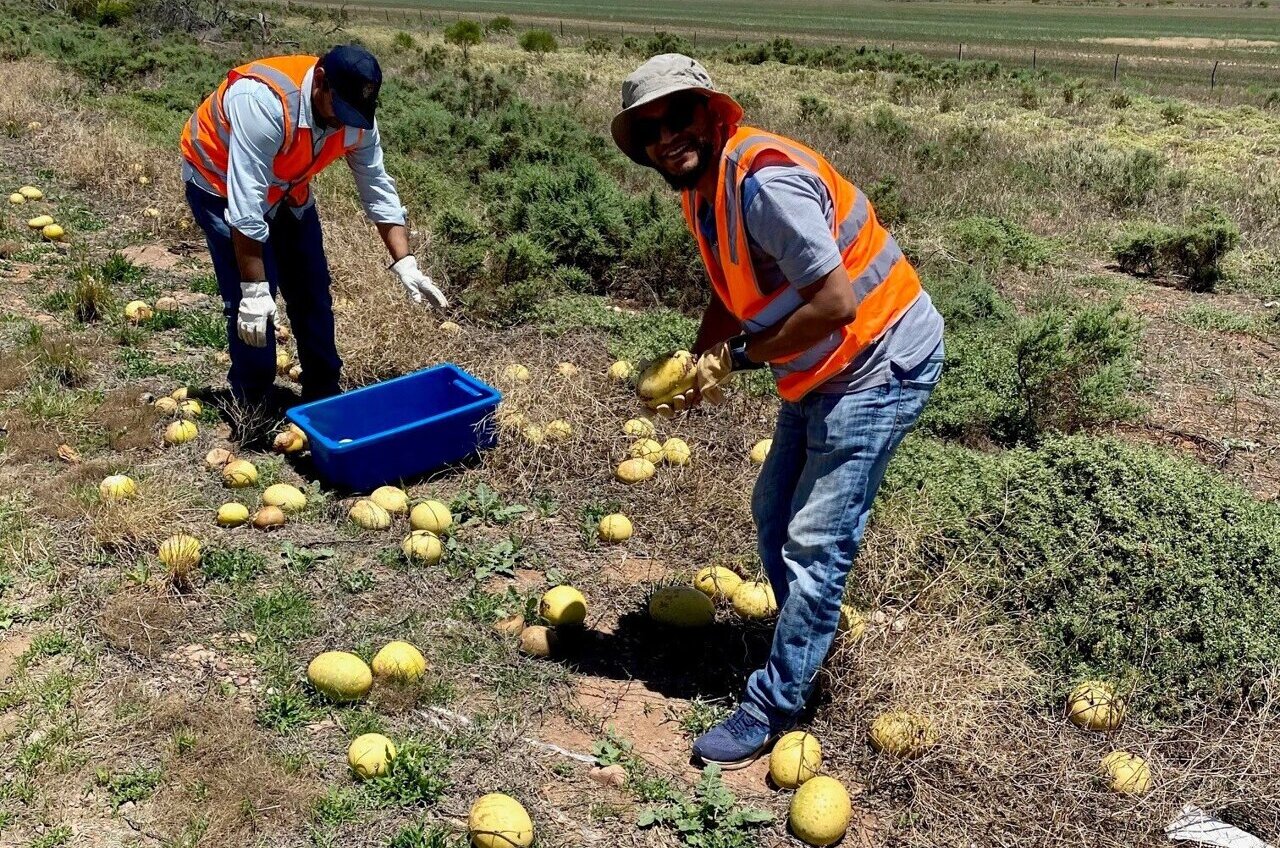
Prof Rahman and Dr Karim collecting paddy melons for urease enzyme extraction. Credit: University of South Australia
One of the most invasive Australian weeds is being touted as a potential economic crop, with benefits for the construction, mining and forestry industries, and potentially many First Nations communities.
The prickly paddy melon weed, which costs the agricultural industry around $100 million a year in lost grain yields, cattle deaths, and control measures, could turn into an unlikely money spinner as a source of urease enzymes to create bio cement and prevent soil erosion.
In a world-first study, researchers at the University of South Australia (UniSA) screened 50 native plants and weeds to find a cheaper and more environmentally friendly source for bulk producing of urease enzymes to strengthen soil. They presented their findings at The International Conference on Sustainable Civil Engineering and Architecture.
Among the weeds tested, paddy melon ticked all the boxes and was almost as effective as soybean enzymes, which are more expensive and used primarily for food.
UniSA geotechnical engineer Professor Mizanur Rahman and his students collected the paddy melon weed from roadsides in Port Pirie in South Australia. After crushing the seeds and extracting enzymes in a liquid form, they freeze-dried them to create a powdered, high-concentration cementation agent.
“Using this technique, we cut down the cementation time from one week to six hours,” says Prof Rahman.
Individual plants can yield 50 or more paddy melons, each containing up to 200 viable seeds. Taking into consideration the time taken to harvest, extract the seeds and turn them into a powder, the UniSA researchers estimated a 75% saving compared to lab-grade enzyme production costs.
Plant-based urease enzymes are becoming a popular alternative to cement, lime or artificial soil binders because they are natural and not damaging to the environment. One kilogram of cement produces one kilogram of carbon dioxide, making the construction industry one of the highest CO2 emitters.
“Compared to the production of commercial enzymes, paddy melon enzymes are cheaper, more sustainable, and more efficient than other enzymes used to cement and stabilize soils.
“Not only have we found a natural alternative to other commercial enzymes, but we could solve a very expensive problem for the agricultural industry by harvesting these weeds, reducing the availability of seeds for spreading, preserving biodiversity and growing paddy melon as a commercial crop.”
The construction, forestry and mining industries all stand to benefit from this research, but another unexpected winner could be some First Nations communities, Prof Rahman says.
“Paddy melon is an invasive weed on many Native Title lands and soil erosion is another major issue. Our discovery has the potential to address both of these concerns and support biodiversity conservation or rehabilitation.”
The paddy melon enzymes could also be used to stabilize tailing dams and cap them with a thin natural crust, preventing toxic waste material from escaping.
In forest plantations herbicide is normally applied at the base of commercially grown trees to keep weeds under control.
“Herbicide is not only harmful to the environment but weeds often develop a resistance to these chemicals,” Prof Rahman says. “Spraying paddy melon enzyme solution around the trees would create a thin crust, preventing weeds completely. In essence, we are using a weed to control a weed.”
Prof Rahman says the feedback from industry sectors has been very positive.
“Paddy melon is the most significant weed in Australian summer fallow areas, affecting grain crops. Managing this invasive plant is crucial due to its detrimental impact on farming systems, biodiversity and grazing livestock.
“I believe we have found a win-win solution that helps not only farmers, but also offers a natural cementation option for several industries and may help Traditional Owners protect or rebuild land that they manage.”
More information: M. V. Tran et al, Powdered Enzyme from Australian Weed for Bio-stabilisation, Proceedings of the Third International Conference on Sustainable Civil Engineering and Architecture (2023). DOI: 10.1007/978-981-99-7434-4_126
Provided by University of South Australia
This story was originally published on Phys.org. Subscribe to our newsletter for the latest sci-tech news updates.
News Related-
Russian court extends detention of Wall Street Journal reporter Gershkovich until end of January
-
Russian court extends detention of Wall Street Journal reporter Evan Gershkovich, arrested on espionage charges
-
Israel's economy recovered from previous wars with Hamas, but this one might go longer, hit harder
-
Stock market today: Asian shares mixed ahead of US consumer confidence and price data
-
EXCLUSIVE: ‘Sister Wives' star Christine Brown says her kids' happy marriages inspired her leave Kody Brown
-
NBA fans roast Clippers for losing to Nuggets without Jokic, Murray, Gordon
-
Panthers-Senators brawl ends in 10-minute penalty for all players on ice
-
CNBC Daily Open: Is record Black Friday sales spike a false dawn?
-
Freed Israeli hostage describes deteriorating conditions while being held by Hamas
-
High stakes and glitz mark the vote in Paris for the 2030 World Expo host
-
Biden’s unworkable nursing rule will harm seniors
-
Jalen Hurts: We did what we needed to do when it mattered the most
-
LeBron James takes NBA all-time minutes lead in career-worst loss
-
Vikings' Kevin O'Connell to evaluate Josh Dobbs, path forward at QB
